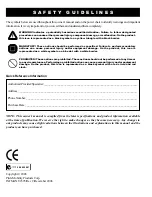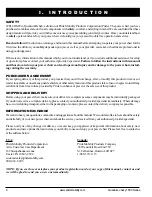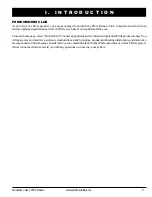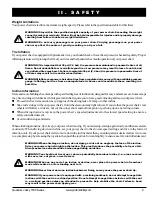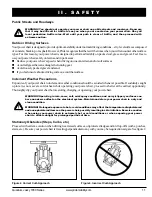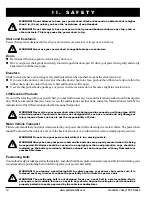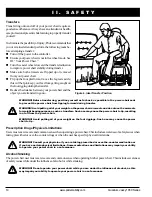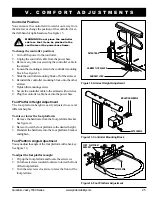
10
www.pridemobility.com
Quantum Jazzy 1650 Series
I I . S A F E T Y
5 (8.7%)
Figure 1. Maximum Safe Slope (Ascending and Descending)
WARNING! Even though your power chair is capable of climbing slopes greater than those illustrated
in figure 1, do not, under any circumstances, exceed the incline guidelines or any other
specifications presented in this manual. Doing so could cause instability in your power chair.
In compliance with the Americans with Disabilities Act of 1990, all handicap public access ramps are required to have a
maximum slope of 5° (8.7%). Therefore, Pride recommends that the maximum slope of an incline you attempt to safely
ascend or descend on your power chair does not exceed 5° (8.7%). See figure 1.
WARNING! Any attempt to climb or descend a slope steeper than 5° (8.7%) may put your power
chair in an unstable position and cause it to tip.
Freewheel Mode
Your power chair is equipped with two manual freewheel levers to allow for manual maneuverability by a trained attendant.
For more information about how to place your power chair into and out of freewheel mode, see III. “Your Power Chair.”
WARNING! Do not use your power chair in freewheel mode without an attendant present.
WARNING! Do not attempt to personally place your power chair in freewheel mode while seated
on it. Ask an attendant for assistance if necessary.
WARNING! Do not place your power chair in freewheel mode while on an incline. This could cause
the chair to roll uncontrollably on its own.
Braking Information
Your power chair is equipped with two powerful brake systems:
!
Regenerative — uses electricity to rapidly slow the vehicle when the joystick returns to the center/stop position.
!
Disc Park Brake — activates mechanically after regenerative braking slows the vehicle to near stop, or when power is
removed from the system for any reason.
Cornering Information
While your power chair is equipped with rear caster wheels and front anti-tip wheels, excessively high cornering speeds
can still create the possibility of tipping. Factors which affect the possibility of tipping include, but are not limited to:
cornering speed, steering angle (how sharply you are turning), uneven road surfaces, inclined road surfaces, riding from an
area of low traction to an area of high traction (such as passing from a grassy area to a paved area – especially at high
speed while turning), and abrupt directional changes. High cornering speeds are not recommended. If you feel that you
may tip over in a corner, reduce your speed and steering angle (i.e., lessen the sharpness of the turn) to prevent your power
chair from tipping.
WARNING! When cornering sharply, reduce your speed and maintain a stable center of gravity.
This greatly reduces the possibility of a tip or fall.


